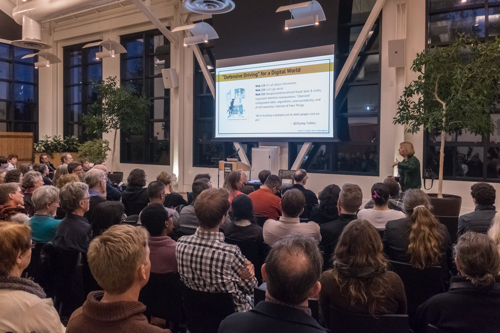Campus News
Author calls on faculty to reimagine higher education
Cathy N. Davidson delivered a talk based on her latest book, which argues that our universities are based on an outdated and unequitable model, and pushes for a student-centered approach to education.


In an effort to better prepare students for today’s complex and changing world, professor and author Cathy N. Davidson delivered a talk that chronicled the ways in which educators nation-wide are rethinking higher education and changing how and what is taught at universities.
“When we’re being ‘traditional,’ we’re not being traditional,” Davidson said. “People who say nothing has changed in higher education since Socrates walked the floor of the academy—no! Higher education went through massive, systematic, infrastructural, conceptual change for a historical contingency, which was the industrial age.”
Davidson, the founding director of the Futures Initiative and a distinguished professor at the Graduate Center, City University of New York (CUNY), was invited to speak at UC Santa Cruz by the Center for Innovations in Teaching and Learning (CITL) for its annual convocation on March 1 at the University Center. The Humanities Teaching and Learning Now research cluster of UCSC’s Humanities Institute co-hosted the event. Davidson delivered a talk based on her latest book, The New Education: How to Revolutionize the University to Prepare Students for a World in Flux, which argues that our universities are based on an outdated and unequitable model, and pushes for a student-centered approach to education.
In a room full of rapt faculty members, undergraduate students, graduate students, staff, and campus leaders, Davidson offered a brief history of how Charles Eliot, the youngest and longest-serving president of Harvard University, set about to reform U.S. higher education to respond to the needs of the Industrial Age. She then argued that universities have failed to keep pace with the digital transformation that has reshaped the world.
Davidson noted that there have been many calls in the past decade to change higher education, but they’ve been rooted in someone’s desire to make more money, not to prepare students for the world. She first called out the “most pernicious” effort to “unbundle” education so that it focuses solely on job skills, opening up other areas for defunding.
Citing two studies by Google—Project Oxygen, which focused what makes for a great manager, and Project Aristotle, which looked at building a perfect team—Davidson underscored that technology skills are not as essential as cross-cultural communication, collaboration, supporting employees, offering a clear vision, and more.
“Right in the belly of the beast, skills aren’t just tech skills,” she said. “They’re also complex thinking, implementation, connection, and multicultural and multilingual skills.”
Offering examples of new approaches, Davidson cited the big thinking at the Georgetown University’s Red House, which is asking educators far-reaching questions: What forms of higher education are only possible now? What if a curriculum focused on a problem or issue and not a discipline?
In another example, Davidson discussed how the history department at Yale University decided to offer two majors—one for students hoping to become tenure-track faculty members and another general degree that placed all lessons in a global perspective and looked at what precipitated a particular historical event and what followed.
The result, she said, is that the university is finding ways to improve its professional major and that history is once again Yale’s most popular major—the first time since 2000.
“What happens when you make change?” she asked. “It doesn’t have to be a disaster.”
Given the significant and continuing impact of the internet, Davidson said higher education must do a better job of preparing students for a world that continues to evolve—calling it “defensive driving for a digital world.”
“I think that almost every field at the university has something crucial to contribute to understanding a pretty fraught world we’re living in now,” Davidson said. “but very few disciplines have really thought ‘What are we are contributing to arm our students for the world we’ve foisted on them?’”
CITL Director Jody Greene, a professor of literature, said the center distributed 150 copies of Davidson’s book to faculty across the academic divisions, which has started a cross-campus dialogue about what new approaches might—or might not—work at UC Santa Cruz.
Greene noted that Davidson’s work walks a fine line on the role of higher education—insisting on the need to equip students both with job skills and with the critical thinking skills to lead a thoughtful and meaningful life.
“(Cathy Davidson) sees the faculty of the university as the key changemakers when it comes to the most-needed transformations in higher education,” Greene said. “She is catalyzing a higher education revolution from below, which seems like a pretty good idea, given the painful record of top-down efforts to save this nation’s colleges and universities from an incipient mass extinction.”
The Center for Innovations in Teaching and Learning was established in July 2016 to revitalize the university’s longstanding commitment to outstanding teaching. The CITL aims to provide support and resources for all who teach on campus, and especially focuses on the areas of inclusive teaching and teaching with technology.